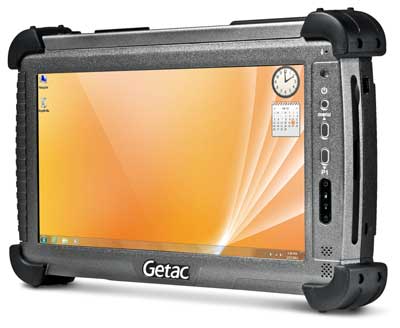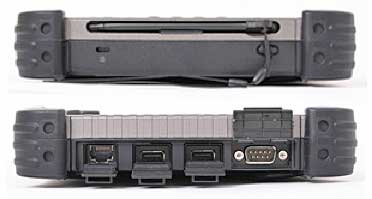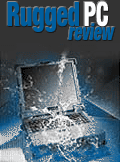With the tablet form factor having gained near universal acceptance, Getac's July 11, 2012 announcement of the E110 fully rugged tablet computer couldn't be more timely. That's because of the numerous customers finally willing to integrate tablets into their workflow, a good many need hardware much tougher than consumer tablets. The new E110 is a tablet. It is tough. It has up-to-date technology. And Getac's years of experience in rugged computers guarantee that it all works right out of the box. Here's what the new E110 looks like:

What is the Getac E110? A tablet computer designed to run under the most adverse operating conditions. A system running Windows so it can take advantage of all the existing vertical market industry-specific application software out there. A system that can be used with gloves on and when it rains. But also a system based on Intel's latest and rather powerful Atom processor technology. A system with a large, contemporary wide-format display with full 1366 x 768 pixel resolution. And a system that, thanks to Getac's unique resistive multi-touch technology (see here), is fully prepared for the upcoming touch-optimized Windows 8 operating system while still offering the precision only a stylus can offer.
As for specs, the Getac E110 measures 11 x 7.2 inches and is about 1.6 inches thick. It weighs about 3.5 pounds, a good deal more than media tablets, but that's because it's also nearly indestructible. The display measures 10.1 inches diagonally, providing the kind of screen real estate tens of millions of tablet users now take for granted. Anyone who intends to work outdoors with an E110 will want to order the machine with the optional super-bright 750 nits "QuadraClear" sunlight-readable display with its advanced anti-reflective coatings.
The tablet is powered by a 1.86GHz dual core Intel Atom N2800 processor, a 32nm process technology chip that not only integrates speedy graphics, but also provides significantly better performance than any prior Atom processor. There is 4GB of DDR3 DRAM, and the E110 comes with a 64GB SATA solid state disk. Expansion is via a traditional PCMCIA Type II card slot which, of course, can accommodate adapters for numerous other card formats. The Li-Ion smart battery packs 5,200mAH, said to be good for about five hours of battery life. There's also an embedded backup battery to support hot-swapping. A 3-megapixel camera is optional.

For wired connectivity there are two USB 2.0 ports, a legacy serial port, an RJ45 gigabit LAN jack, an audio mini-jack, an RF antenna port, and a docking connector. On the wireless side, the E110 has dual band 802.11a/g/n WiFi via an Intel Centrino Advanced-N 6205 module and Class 1 Bluetooth v4.0. Optionally available: SiRFstar IV GPS and Gobi 3000 carrier/technology independent WAN.
On the ruggedness side, the information listed in the specs and press release is still a bit sketchy. Getac President Jim Rimay is quoted as saying "Its fully rugged exterior and solid state storage protect system components and invaluable files from typical environmental hazards including heat, cold, and drops, vibration and shock." For hard specs, we currently only know that the operating temperature range is 32° to +140° Fahrenheit with a -6° Fahrenheit low temperature option, sealing is at the IP65 level (the "6" means total protection against dust, and the "5" protection against low pressure water jets from all directions), and Getac also claims a 3-foot drop spec as well as an overall military grade MIL-STD-810G rating.
In summary, this new rugged Getac E110 tablet seems to offer a very attractive blend of legacy compatibility/support and next gen design and technology that should greatly appeal to its intended audience in field service, utilities, industry and public safety. We can't wait to do some hands-on testing.








